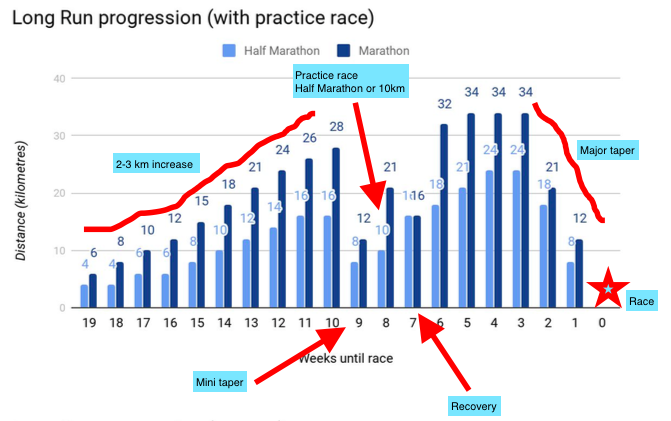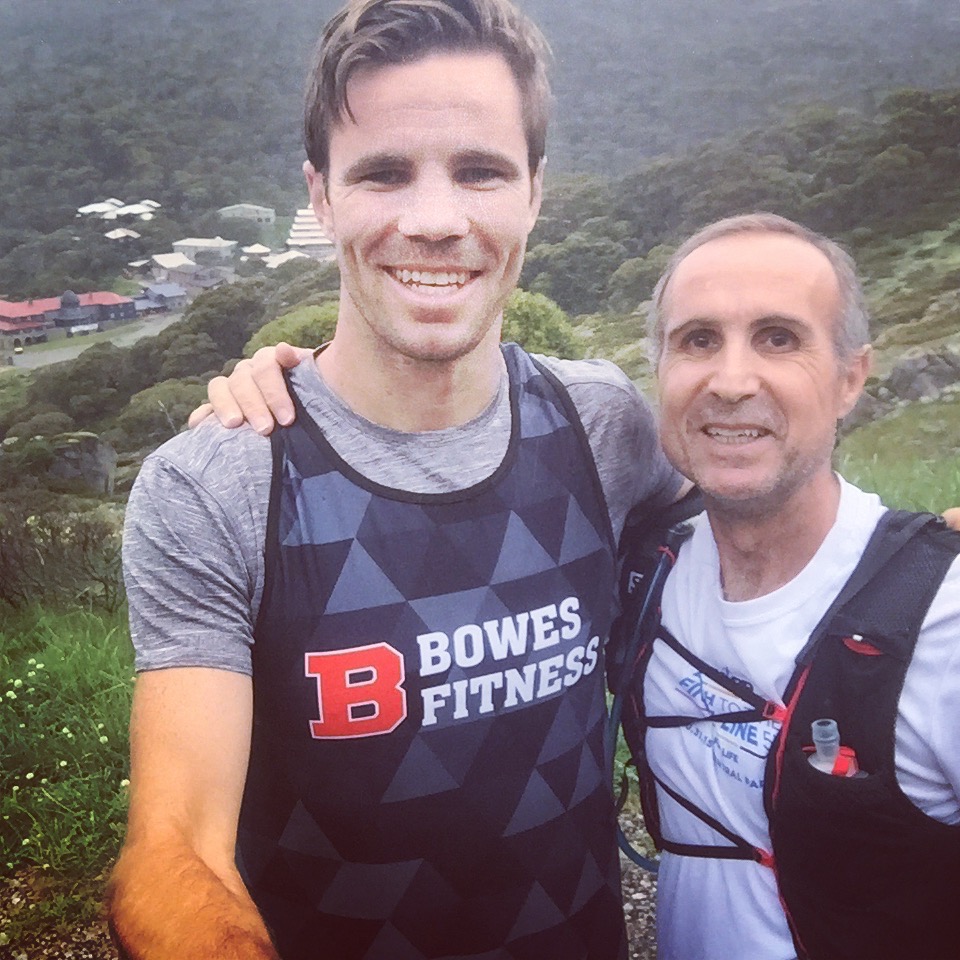
By Sean Bowes - 2:26 marathon runner, track and field coach, online running coach
Long runs are the most important part of your training regime. But tread carefully, it's easy to overload too early and risk an injury. Here's some advice on how to make your Long Run schedule a productive experience and get to race day cherry ripe.
When training for endurance running the most important thing, above any other, is being able to last the distance. We train for this by doing long runs. Typically done on Sunday morning, when you’ve got time, the roads are empty and have a chance to recover during day. It's a big ask on a Sunday but that's the price of entry.
It’s a lesson that has to be learnt (usually the hard way)
I remember “training” for my first marathon. I was doing everything right, except the long run. I rationalised by saying, “I’ve raced a few half marathons, I’ll just tough it out beyond 21km.” Yeah, good plan.
So we know what to do. You have to practice running as far - or as long as - your race requires. I say - as long as - because the marathon is really long (42km), typically runners won't run that far in training, it's too long. A 2:30 marathoner might aim to run 35km in 2:30 in training, rather than the full 42km. Half marathoners, should be able to go above and beyond the distance since your race is much shorter, 24-26km for example.
What should you long run regime look like?
It depends where you’re starting and how long you’ve got to prepare. Obviously if you leave too late some things become impossible. That’s why it’s good to be organised and get cracking early.
For argument’s sake, let say you're coming off minimal base, Christmas has just passed and you know you can run 4-6km. And maybe 10km at a stretch. I find most people around this level, especially post-Christmas.
Here’s an example of what your Long Run progression might look like…

If you were going to Long Run every weekend, you're progression might look like this. This is a typical 20 week Marathon or Half Marathon training regime. Note these features:
The major problem facing most runners is one of these two scenarios:
I'm always harping on to my athletes: get organised! You should spread your year out in front of you, visually, so you can see just how many (or how few) months, weeks, days there is until you report to the start line. Trust me it comes around quick.
Futhermore, with endurance running such long distances, it's not like you can cram these runs together to make up time. So even if you had the wherewithal to train often, you'll damage your body thus affecting your racing performance - or even making the start.
I coached a guy once...
Tokyo marathon was 6 weeks away. He said, "Well, I didn't do anything in the first six weeks can I double my load for the next six weeks and still race well?"
That's a true story. He tore his calf two weeks later. Tokyo still not done.
So if you're organised, now be patient
Recently I heard a story about the Women's World Record Holder in the Marathon, Paula Radcliffe. Moving up from track (5-10km) to Marathon, Radcliffe increased her long runs by just 5 minutes each week, to adjust slowly. Going from 2:00, to 2:05, to 2:10 and so on. Whereas most runners would take a (supposed) short cut and jump in 15 minute blocks, risking overload and injury.
Radcliffe’s method is no-doubt wise by avoiding the aforementioned overload and potential injury. But the real genius is this, your long run will top out somewhere - for marathon it’s usually around 35/36km. However, if you build your longs runs up slowly, by 5 mins, instead of 15, you’ll build a body of work much greater than the faster alternative. This helps resilience and endurance. Look at the table below:
5 minute increments | 15 minute increments |
|---|---|
2:00 | 2:00 |
2:05 | 2:15 |
2:10 | 2:30 |
2:15 | 2:45 |
2:20 | 3:00 |
2:25 | |
2:30 | |
2:35 | |
2:40 | |
2:45 | |
2:50 | |
2:55 | |
3:00 | |
Number of runs: 15 | Number of runs: 5 |
Time spent running: 32:30 | Time spent running: 14:30 |
Differential: 10 runs and 18 hours |
Not only does this method help you to avoid injury from overloading, let's say you miss a run, losing one session out of fifteen is much less dramatic than one of five. Moreover, if you do skip to the next week's long run, the jump in volume less drastic. Safety always.
At the end of the day...
You know you're going to have to run a long way in this damn race. You're best off preparing for it properly. Organise yourself six months out from the race (half marathon could be 3-4 months) and do some running, so you're familiar with where your body's at and what you're capable of. Then draw up a planning chart that you can plot your long runs on so the race doesn't creep up on you. Implement all the features in the picture above, like:
If you want to download my FREE Long Run progression PDF, click the button below to get you hands on it. Print it out and stick it on your wall.
Marathoners...
Gold Coast Marathon will be run on 7 July, just 22 weeks away. If you're serious about getting prepared - there's no more "Wait 'til after Australia Day" excuses. The time is now, to sketch out your planner and plot your training progression towards race day, our 20 week Marathon Training Program will set you up nicely for the biggie.
Those interested in my training programs can hit the Bowes Fitness products page to have a look at the offerings.
Half Marathoners...
Sydney Morning Herald Half Marathon is on 19 May, with our 12 week Half Marathon Training Program you could be styling in the Harbour City. This race could also form as a practice hit out for the aforementioned Gold Coast Marathon - 6 weeks later. Think about it. Information and enrolments are available on the Bowes Fitness products page.
Do you know someone who would benefit from this story? Share it on your social networks, click below...

I’m Sean Bowes, 2:26 marathon runner and sub 70 minute half marathoner. An Athletics Australia accredited coach, I coach runners in distances from 5km to marathon, either personally, online or in my Sydney-based training squad. My squad members have had success in:
- London Marathon
- New York Marathon
- Los Angeles Marathon
- Gold Coast Marathon and Half
- Hong Kong Half Marathon
- Melbourne Marathon
- Canberra Marathon and Half
- City2Surf
- Sydney Marathon
- Parkrun USA, UK and Australia
I draw on years of experience in competing and coaching to give informative advice and tell interesting yarns about colourful characters and unusual situations to keep training entertaining and a learning experience. My flagship introductory offering is my FREE ‘30 Days to 10k’ Training Program, click here to get your copy.
